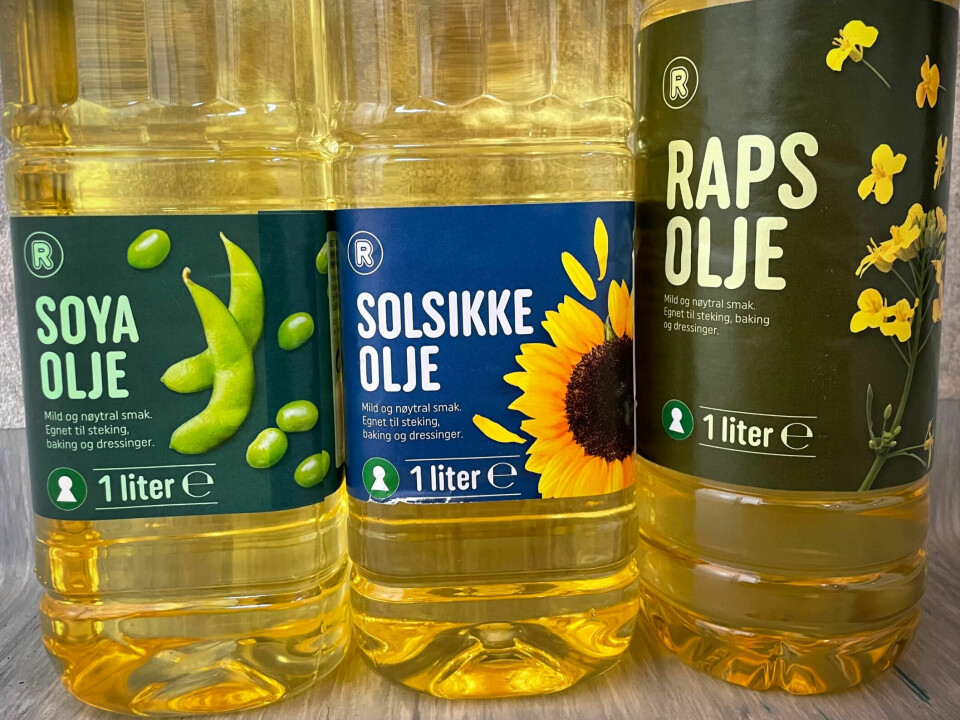
The ‘Nordic olive oil’ is the healthiest of the common cooking oils
Feel free to use rapeseed oil when frying your food, the researcher says.
Most people are aware that they can use vegetable oils in cooking instead of animal fats.
But when you stand in front of the shelf of vegetable oils in the store, what should you choose?
Is there really any difference between sunflower oil, soybean oil, and rapeseed oil?
Contains the most Omega 3
“I would choose rapeseed oil,” Astrid Nilsson says.
The expert from the research institute Nofima explains that sunflower oil, soybean oil, and rapeseed oil are all good choices for cooking.
“The reason I choose the latter is because of the content of the fatty acids Omega 3 and Omega 6,” she says.
These are fatty acids that the body needs but cannot produce on its own, Nilsson explains. Therefore, we need to get them through our food.
“In a typical Norwegian diet, we generally get enough Omega 6. But we might not get enough Omega 3,” she says.
Rapeseed oil has the most Omega 3.
Using it contributes to a good balance between Omega 3 and Omega 6 fatty acids – and what are called signaling molecules from these – in your body.
“Especially for people who struggle with stiff joints and such, it is important to get enough Omega 3,” Nilsson emphasises.
Rapeseed oil also contains a lot of monounsaturated fatty acids. In that sense, it resembles olive oil.
This is why some call it the ‘Nordic olive oil’.
Use refined oils for frying
In Norway, we often use vegetable oils for frying.
“Then it is important to use a vegetable oil that is refined,” the researcher says.
These oils are generally cheaper than the ‘finer’ cold-pressed oils.
The more expensive cold-pressed rapeseed oil does not belong in the frying pan. Neither does extra virgin olive oil.
The cold-pressed oils with many healthy plant compounds – including natural antioxidants – are better used in salads or poured over pasta if you wish.
In short, it is because some components in cold-pressed rapeseed oil and cold-pressed olive oil (extra virgin) can be converted into harmful substances when exposed to high heat in the frying pan.
“There are only a few cold-pressed oils that are suitable for frying. The producer has filtered out the components that can be harmful when heated. That’s why it explicitly says on the bottle that the oil is suitable for frying,” she says.
Cooking oils are not ultra-processed
Refined cooking oils may sound a little scary.
“Many people are concerned about ultra-processed food. While cooking oils are refined, they cannot be considered ultra-processed,” Nilsson reassures.
The expert on cooking oils does not believe that you should avoid all animal fats with a high content of saturated fatty acids in your diet. But it’s good to limit the intake of animal fat.
“I personally cook meat or vegetables in a vegetable oil,” she says. “Then, at the end, I add a dollop of butter. That gives me a nice brown colour and a little extra flavour in the food.”

Rapeseed oil from the Nordic countries
If you buy rapeseed oil in the store, it is quite likely that it comes from a Nordic country.
“The yellow rapeseed you see in the fields in Norway is mostly used for animal feed,” Nilsson says.
But you also find some nice Norwegian cold-pressed oils made from rapeseed.
“Most of these are only suitable for cold dishes,” she says. “But you can also find Norwegian rapeseed oil that is suitable for frying – and it is clearly labelled as such.”
The difference between rapeseed oil and olive oil
Are you wondering about the health difference between the ‘Nordic olive oil’ rapeseed oil and the healthy olive oil from Southern Europe?
“In short, both have a lot of healthy unsaturated fatty acids, but the first one has a more balanced content of Omega 3 and Omega 6 fatty acids,” Nilsson says.
Something that is good for our bodies.
———
Translated by Alette Bjordal Gjellesvik.
Read the Norwegian version of this article on forskning.no
































